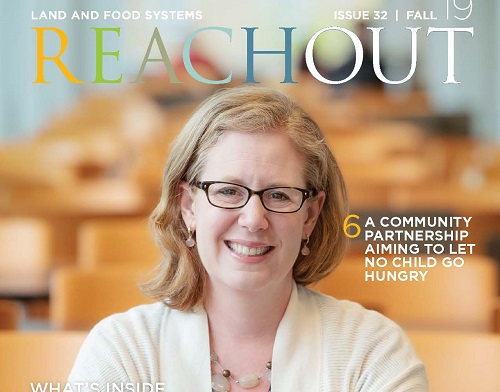Monitoring Ecological Sustainability at the UBC Farm
The UBC Farm acts as a living lab for researchers working to improve sustainability in agricultural systems, and is now a key node in an international experimental network of diversified research farms.
The Diversified Agroecosystems Research Cluster, based at the Centre for Sustainable Food Systems (CSFS), is positioning the UBC Farm as a Long-Term Socio-Ecological Research Station (LTSER). The Farm will become one of North America’s few diversified farms to become a LTSER.
“This is a game-changing development that will transform research possibilities at UBC and beyond,” said Laura Morillas, Research Manager at CSFS.
Two new long-term ecological monitoring programs are now underway at the UBC Farm, supported by the cluster. Using lowcost
data collection methods, these projects offer new data-driven management tools to help farmers understand ecological
outcomes related to their management practices, providing key insights on ways to both mitigate and adapt to climate change.
Data-driven agroecology allows farmers to observe, measure and respond in real time to crop and climate variabilities. While
data-driven technology has been adopted on some larger commercial farms focusing on commodity crops, it is relatively new for
smaller and diversified farms.
These new projects aim to change that.
UBC Farm as a Living Lab: Water Sustainability
Agriculture accounts for 70 per cent of global water allocations, placing water quality and scarcity at the centre of issues related to sustainable food production and food security.
Mark Johnson, a CSFS associate member, is piloting an agricultural water use data system at UBC Farm. Johnson is Canada Research Chair in Ecohydrology and a UBC Professor with a joint appointment in the Institute for Resources, Environment and Sustainability and the Department of Earth, Ocean, and Atmospheric Sciences in the Faculty of Science.
Sensors powered through small solar panels combined with data connectivity, visualization and analytics will help the UBC Farm develop improved irrigation and post-harvest water use strategies.
“Measuring the amount of water used in irrigation, together with data on water at different depths in the soil, will help farmers evaluate the effectiveness of their irrigation strategies,” said Johnson. “We are also tracking the amount of water used to wash produce after harvest to better understand where opportunities lie for improving overall water use in agriculture.”
His team has installed an autonomous soil moisture monitoring network and climate station to check plant water needs, soil water status and climatic conditions.
By evaluating opportunities to reduce water use at UBC, UBC Farm and CSFS are able to transfer this knowledge and affordable technology to planners, regulators and farmers that are trying to meet growing food security issues.
UBC Farm as a Living Lab: Biodiversity Monitoring
UBC faculty and students in the Diversified Agroecosystems Research Cluster have developed and are implementing a world-class long-term biodiversity monitoring program for agricultural landscapes at the UBC Farm.
The project is coordinated by the CSFS, with research support from the cluster, as well as the Campus Biodiversity Initiative: Research and Demonstration (CBIRD), and UBC Campus as a Living Laboratory Initiative.
Juli Carrillo, Acting Academic Director of the CSFS and Assistant Professor in Land and Food Systems, and Matt Mitchell, a postdoctoral fellow in the Institute for Resources, Environment and Sustainability, have led the development and implementation of the Biodiversity Monitoring Plan.
“Biodiversity loss, often driven by agricultural activities, is occurring rapidly worldwide,” said Mitchell. “It’s especially important to come up with effective methods to track biodiversity changes in agroecosystems, since biodiversity plays a critical role in food production and provides a variety of ecosystem services that benefit farmers and people.”
Using the UBC Farm as a pilot site, the program will help characterize biodiversity from microbes to mammals.
Some of the team’s data collection methods include acoustic recorders to capture wildlife sounds from birds, bats and amphibians, and remotely operated digital cameras to photograph mammals on the farm.
“First, we need to establish a baseline of biodiversity at the UBC Farm, and over time we will learn more about how farming practices impact biodiversity, and vice versa, and how those changes in turn affect food cultivation,” said Laura Morillas, Research Manager at CSFS.
The Diversified Agroecosystem Research Cluster is the recipient of a Grants for Catalyzing Research Clusters, supported by the UBC Excellence Funds. Find out more at ubcfarm.ubc.ca/darc.
Tagged with: 2019, Sustainable Agriculture and Environment, UBC Farm
